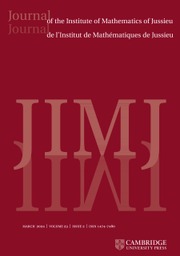Crossref Citations
This article has been cited by the following publications. This list is generated based on data provided by
Crossref.
Slooten, K.
2005.
A Combinatorial Generalization of the Springer Correspondence for Type Bn.
Acta Applicandae Mathematicae,
Vol. 86,
Issue. 1-2,
p.
159.
Aubert, Anne-Marie
and
Plymen, Roger
2005.
Plancherel measure for GL(n,F) and GL(m,D): Explicit formulas and Bernstein decomposition.
Journal of Number Theory,
Vol. 112,
Issue. 1,
p.
26.
Slooten, K.
2006.
Generalized Springer correspondence and Green functions for type B/C graded Hecke algebras.
Advances in Mathematics,
Vol. 203,
Issue. 1,
p.
34.
Ciubotaru, Dan
2008.
On unitary unipotent representations of 𝑝-adic groups and affine Hecke algebras with unequal parameters.
Representation Theory of the American Mathematical Society,
Vol. 12,
Issue. 19,
p.
453.
Delorme, Patrick
and
Opdam, Eric M.
2008.
The Schwartz algebra of an affine Hecke algebra.
Journal für die reine und angewandte Mathematik (Crelles Journal),
Vol. 2008,
Issue. 625,
Slooten, K.
2008.
Induced Discrete Series Representations for Hecke Algebras of Types and.
International Mathematics Research Notices,
Vol. 2008,
Issue. ,
Opdam, Eric
and
Solleveld, Maarten
2009.
Homological algebra for affine Hecke algebras.
Advances in Mathematics,
Vol. 220,
Issue. 5,
p.
1549.
Opdam, Eric
and
Solleveld, Maarten
2010.
Discrete series characters for affine Hecke algebras and their formal degrees.
Acta Mathematica,
Vol. 205,
Issue. 1,
p.
105.
Parkinson, James
and
Schapira, Bruno
2011.
Random Walks, Boundaries and Spectra.
Vol. 64,
Issue. ,
p.
15.
Delorme, Patrick
and
Opdam, Eric
2011.
Analytic R-groups of affine Hecke algebras.
Journal für die reine und angewandte Mathematik (Crelles Journal),
Vol. 2011,
Issue. 658,
Ciubotaru, Dan
and
Kato, Syu
2011.
Tempered modules in exotic Deligne–Langlands correspondence.
Advances in Mathematics,
Vol. 226,
Issue. 2,
p.
1538.
Solleveld, Maarten
2012.
Parabolically Induced Representations of Graded Hecke Algebras.
Algebras and Representation Theory,
Vol. 15,
Issue. 2,
p.
233.
Solleveld, Maarten
2012.
On the classification of irreducible representations of affine Hecke algebras with unequal parameters.
Representation Theory of the American Mathematical Society,
Vol. 16,
Issue. 1,
p.
1.
van Diejen, J.F.
and
Emsiz, E.
2012.
Unitary representations of affine Hecke algebras related to Macdonald spherical functions.
Journal of Algebra,
Vol. 354,
Issue. 1,
p.
180.
Ciubotaru, Dan
Kato, Midori
and
Kato, Syu
2012.
On characters and formal degrees of discrete series of affine Hecke algebras of classical types.
Inventiones mathematicae,
Vol. 187,
Issue. 3,
p.
589.
Heiermann, Volker
2012.
Algèbres de Hecke avec paramètres et représentations dʼun groupe p-adique classique : Préservation du spectre tempéré.
Journal of Algebra,
Vol. 371,
Issue. ,
p.
596.
Solleveld, Maarten
2013.
Hochschild homology of affine Hecke algebras.
Journal of Algebra,
Vol. 384,
Issue. ,
p.
1.
Cherednik, Ivan
and
Ma, Xiaoguang
2013.
Spherical and Whittaker functions via DAHA I.
Selecta Mathematica,
Vol. 19,
Issue. 3,
p.
737.
Ciubotaru, Dan M.
and
Trapa, Peter E.
2013.
Characters of Springer representations on elliptic conjugacy classes.
Duke Mathematical Journal,
Vol. 162,
Issue. 2,
Opdam, Eric
and
Solleveld, Maarten
2013.
Extensions of tempered representations.
Geometric and Functional Analysis,
Vol. 23,
Issue. 2,
p.
664.


